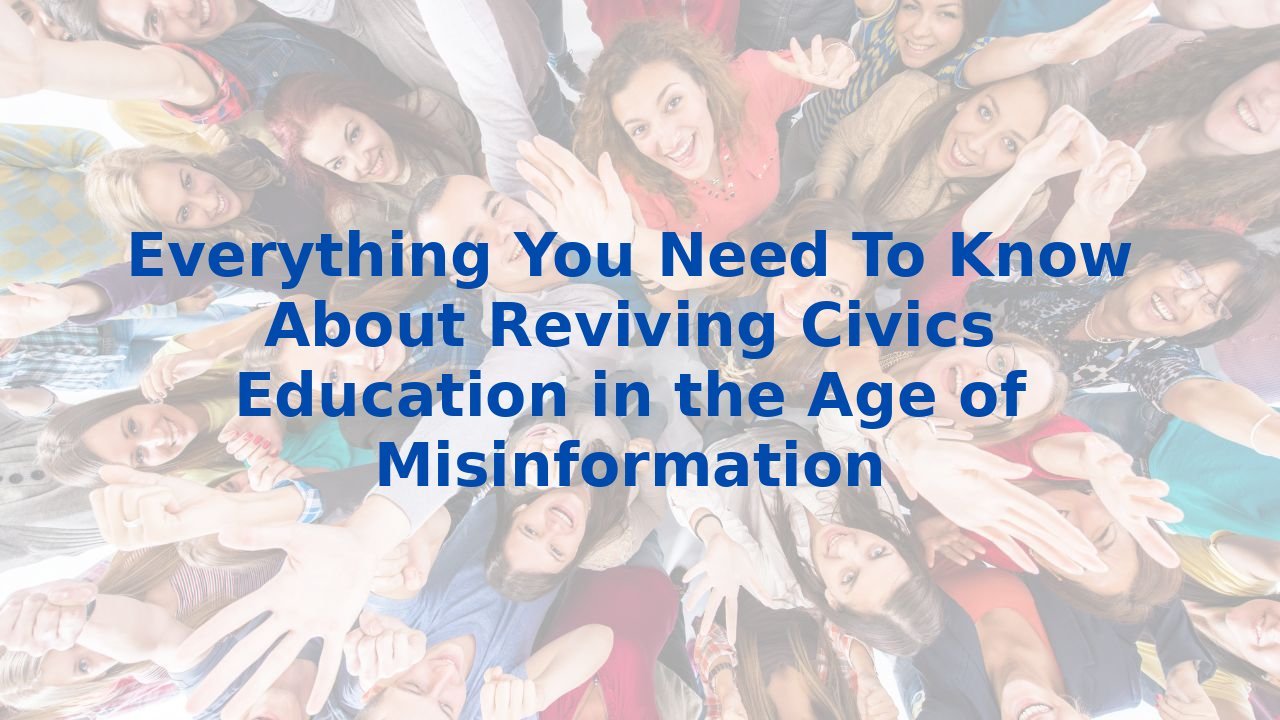Everything You Need To Know About Reviving Civics Education in the Age of Misinformation
The Importance of Civics Education in an Age of Misinformation
In a world dominated by a rapid flow of information, it is easy to feel frustrated and disheartened. The political landscape, particularly the processes surrounding electoral politics, has become increasingly complicated. Yet, amidst this chaos, there lies an urgent need for clarity and understanding; a need that can only be fulfilled through civics education. It is essential to recognize that without a solid foundation in civics, misconceptions proliferate, leaving many citizens to navigate the political arena with little more than hearsay for guidance.
The Urgent Need for Education
Consider the upcoming 2024 Democratic National Convention, where the political process to select Vice President Harris as the party's nominee will unfold. Many people remain confused about the voting process itself, leading some to assume hidden agendas or discrepancies at play. The increasing tides of misinformation underline a crucial truth: we must educate the masses about how governmental systems function if we hope to cultivate an informed electorate.
Historically, civics education has been sidelined. In the 1980s, as educational policies leaned more conservative, the importance of civics began to wane. The No Child Left Behind Act of 2001 further emphasized subjects like math and reading, relegating civics and social studies to the backseat. In recent years, critical funding for civics education has been slashed or eliminated altogether, leaving schools scrambling to maintain a focus on standardized testing subjects.
A Crossroads for Civic Understanding
Today's ignorance surrounding our civic processes is a concern for both sides of the political aisle. Critics from the left argue that civics education is disproportionately incomplete, while voices from the right contend that it does not foster enough patriotism. This bipartisanship in criticism might seem like a conundrum, but it reveals a collective dissatisfaction and a longing for a more robust understanding of civic engagement.
As the public yearns for a clear understanding of their rights and responsibilities, the absence of comprehensive civics education has resulted in increased confusion. Misinformed citizens can easily misinterpret public policies and processes. To combat this, a broad outreach campaign to reintroduce civics education must take center stage.
AI's Role in Revolutionizing Education
Bringing civics education back into our schools is a daunting task, but advancements in artificial intelligence can assist in this mission. AI can elevate teaching and learning experiences, making civics education more engaging and accessible. Machine learning algorithms can analyze student performance and tailor materials to suit their particular learning needs, thus enhancing comprehension. Using interactive AI platforms fosters a dynamic learning environment that inspires curiosity and engagement.
Streamlining Learning with AI
Incorporating AI technology can make key concepts graspable, transforming traditionally dry subjects into interactive experiences. Imagine online simulations that allow students to participate in mock elections, lobby for causes, or debate legislative measures. Through such practical applications, students can gain hands-on experience and genuinely understand the mechanisms of democracy.
Moreover, AI-driven tools can provide real-time updates and fact-checking capabilities, diminishing the impact of misinformation. With access to a wealth of information at their fingertips, students can independently verify claims they encounter in the media, cultivating critical thinking skills.
Empower Your Workforce through AI Training
As we consider the value of education in understanding civic structures and processes, it's equally important to address another critical component—training employees for the future. Companies across diverse sectors can harness AI to enable their workforce to adapt and prosper in this ever-evolving landscape.
Training employees in AI not only equips them with necessary skills to navigate an increasingly technology-driven world, but it can also enhance overall business efficiency. When employees are adept at using AI tools, organizations can streamline operations, reduce redundancy, and foster collaboration across teams.
By investing in comprehensive AI training programs, businesses pave the way for innovation, not just in the realm of productivity, but also creatively solving the challenges that arise from our complex socio-political environment.
"Education is the most powerful weapon which you can use to change the world." - Nelson Mandela
Conclusion
It is high time to revive civics education as a fundamental component of our educational system. By employing modern technology, particularly AI, we can create an informed citizenry prepared to engage meaningfully with the electoral processes that shape our democracy. Simultaneously, it is vital for organizations to focus on training employees for an AI-driven future, ensuring they remain competitive and capable of addressing the challenges that await. The intertwining of civics education and AI offers a promising way forward—one that empowers individuals and cultivates understanding, trust, and resilience in our society.



